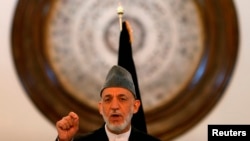Afghanistan’s outgoing President Hamid Karzai in his final address to the nation Sunday night defended his 13-year rule, saying it has laid a “great foundation for our future.”
In his nationally televised speech, Karzai thanked the Afghan nation for supporting him and urged his successor, President-elect Ashraf Ghani, and the country’s new chief executive, Abdullah Abdullah, to continue demonstrating “a spirit of cooperation and partnership” to serve Afghanistan.
Former finance minister Ghani will be sworn in Monday, marking the first ever peaceful transfer of power from one elected government to another in the war-torn country. The ceremony will also see election runner-up Abdullah Abdullah named chief executive, a post similar to prime minister.
“When I first took charge of office, we did not have a flag, or a currency. We were the target of foreign agendas we were homeless in our own country,” said Karzai. "I am proud to have worked toward rebuilding the nation and bringing [people] together to live in their shared homeland under one flag," he added.
Karzai admitted his relentless efforts to establish a lasting peace in the country have remained unsuccessful, but said he is confident that “sooner or later peace will certainly be restored to Afghanistan.” He called on the newly-elected leadership to focus all its energies on accelerating peace efforts.
Karzai has been leading the country since a U.S.-led military coalition ousted the Taliban from power in late 2001.
Foreign leaders have arrived in Kabul to attend the inauguration ceremony for which Afghan authorities have put in place tight security measures.
John Podesta, counselor to President Barack Obama, will be leading the 10-member U.S. delegation to inauguration. It includes American Army General John Campbell who commands the NATO-led International Security Assistance Force in Afghanistan.
The political transition is taking place at a time when the bulk of international forces prepare to leave the country at the end of the year.
Ghani was named president-elect after he signed a power sharing deal with Abdullah that ended months of post-election turmoil in Afghanistan.
U.S. officials have expressed confidence the new Afghan leadership will quickly sign a long-awaited bilateral security deal with Washington that would authorize the presence of a residual American military force in the country past 2014 to continue counterterrorism operations and train Afghan forces for another two years.




